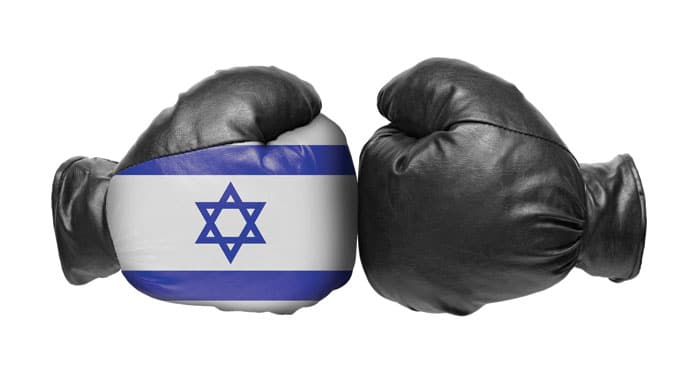 IvancoVlad/Getty Images
IvancoVlad/Getty Images I’ve met plenty of Israelis over the years who have fought in its many wars. But one in particular I can never forget — a first cousin who used to visit us in Montreal. He was the sweetest, kindest person you could meet, always looking for a reason to laugh. But while he loved to talk and schmooze, there was one subject he never talked about: his experiences in the army.
That we had to hear from others.
Evidently, it turns out my sweet, happy-go-lucky cousin was also a ferocious infantry fighter, known for his marksmanship. I remember being mystified by that contrast. How can a happy guy turn into a killer warrior? How does one reconcile such opposite versions of the same person?
There is, of course, the easy answer: There are moments in life when you do what you need to do. No matter who you are or how happy you may be, if you must fight, you fight.
But is it that simple?
I’ve been thinking a lot about this “need to fight” phenomenon since the darkest day of Israel’s history hit us on Oct. 7.
I’ve been wondering, in particular, to what extent external events can end up changing us. If we are forced to constantly fight because we have no choice, how long until the fight itself starts to define who we are?
The fight in Israel is marked by real war — soldiers risking their lives to eradicate terror; citizens mobilizing and volunteering to protect themselves and assist one another. The fight feels endless.
The fight in the Diaspora is more about activism — finding myriad ways to take on the alarming rise in Jew hatred that seems to accelerate by the day. It also feels endless.
In both cases, this is not a fight we went looking for.
When my daughter at NYU put up posters of hostages and got verbally assaulted by haters who tore the posters down, she wasn’t thinking: This is why I came to college. She’d much rather go to her dance class or hang out with friends at Hillel than confront haters. And yet, she’s a Zionist. She loves Israel. She’s a proud Jew. Like thousands of other Jewish students across the country encountering hostility, she didn’t go looking for a fight.
The fight has been forced on the Jewish students, just as it has been forced on Israel.
In my many visits to Israel, the vibe I typically felt was the very opposite of fighting. It’s hard to imagine a society that is more in love with life. You feel it on the streets, in the restaurants and cafés and on the beaches — a vibrant energy, an affinity for drinking the pleasures of life.
The dark side of life, however, is never far away. It always hovers. Every Israeli knows that one terror attack can turn a joyous party into an immediate call to rise and fight.
Since Oct. 7, many of us in the Diaspora have been called to fight, or, more accurately, to fight back. The demonstrations against Jews and Israel have become so over-the-top and pervasive — do we even have a choice?
The question is whether we can fight back without losing our souls. Can we fight back without losing our creative spirit and our sense of optimism? Can we fight ugliness without becoming ugly ourselves, without losing our appreciation for beauty?
One way is through positive expression, as in expressing pride in our Jewish identity.
As Rabbi Nicole Guzik said in her recent Shabbat sermon, which is gracing our cover this week:
“We need you to publicly and positively self-identify as a Jew … This is who we are. And our mantra must be clear: I am a Jew and I’m not going anywhere. Because all of us—we, the Jewish people — are made for a moment like this.”
One of the miracles of the Jewish story has been an ability to go through centuries of struggle and oppression and still maintain a love of life, a love of learning, a love of our tradition, a love of creating, a love of laughter, a love of helping humanity.
We’ve had many such moments throughout our history. Indeed, one of the miracles of the Jewish story has been an ability to go through centuries of struggle and oppression and still maintain a love of life, a love of learning, a love of our tradition, a love of creating, a love of laughter, a love of helping humanity.
This will be our test as we move forward in the wake of Oct. 7: Can we fight when we must, but also find space for joy and sweetness and life, just like my sharpshooter-cousin from Israel?























 More news and opinions than at a Shabbat dinner, right in your inbox.
More news and opinions than at a Shabbat dinner, right in your inbox.